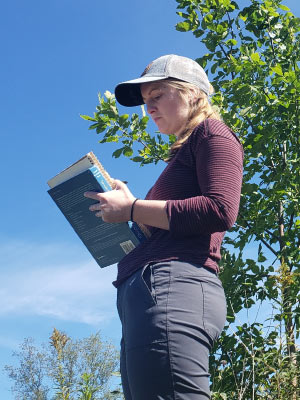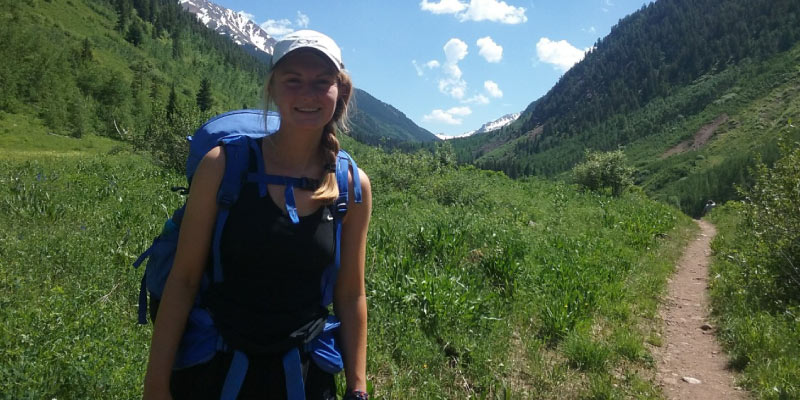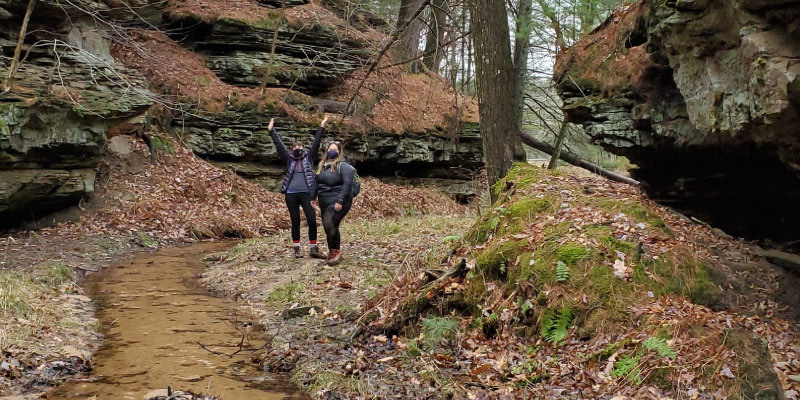
Lifelong Wisconsin Resident Alli Wenman’s educational path has led her to help promote environmental and climate justice in Madison, Wis.
Wenman began the Environmental Conservation MS program at the Nelson Institute in June 2020 and is now working on her final leadership project.
The Environmental Conservation MS Program prepares students to engage, interpret, and respond to critical environmental issues. The 15-month program refines a range of skills to prepare students for a career in conservation through both in-person and online courses, concluding with a final professional leadership project.
Wenman’s final project is with the Wisconsin Initiative on Climate Change Impacts (WICCI). WICCI is a partnership between the Nelson Institute and the Wisconsin Department of Natural Resources that fosters relationships between scientists and other experts to address climate issues. Their work centers around recommendations and evaluation of climate change in Wisconsin.
Wenman’s project focuses on helping update an environmental report titled “Impacts and Adaptation,” originally published in 2011. The updated version is expected to be published in September 2021. The report details the current and projected impacts of climate change on the state of Wisconsin and offers recommendations for adaptation and mitigation plans for key decision makers in the state.
Her main role in the project is to design a framework of questions for scientists working with WICCI to think about how their work intersects with environmental and climate justice.
Wenman’s favorite part of the project, though, has been working alongside a science writer conducting interviews with individuals who have been personally impacted by climate change and are trying to promote a cleaner earth. While this is not her typical work, she has gained resourceful insight on what specific groups want to see done about climate change.
“I love the interviews because we’re talking to people who are doing absolutely amazing work.” Wenman said. “It’s really amazing to see these pockets of people who are dedicating their lives to educating people about climate change, mitigating the effects of it, and making sure we are taking climate action.”
One interview with a Wisconsin farmer revealed the massive issue of flooding many residents of Wisconsin are facing. She said that hearing personal stories like this one helps her understand which environmental issues are most pressing for residents.
Her work with WICCI combines her interest in project management with her love for the outdoors and passion for addressing climate change through adaptation and mitigation. This project is a way for her to work with the environment without directly participating in research or field work.

Wenman’s love for the outdoors started at a young age but came to fruition when she pursued a degree in Botany from UW-Madison. After graduating, Wenman worked a year with Americorps, a non-profit civil service organization. She was located in Alamosa, Colo. where she taught children gardening skills at a camp run by a local non-profit. The group also produced food for local food pantries in the area.
Her decision to return to school at Nelson came after three years of working as an auto insurance adjuster.
“It’s a job that really made me want to go back to school.” Wenman joked.
She wanted to guide her skills and interest in management in the direction of her passion for environmental justice.
“I saw the Environmental Conservation program as a way to do project management for conservation, which is a great fit for me. The program has aspects of program development, management, implementation, evaluation, and a crash course in everything you need to run a program in conservation.” Wenman said. “I absolutely love it.”

Supervising WICCI efforts with Wenman, Dominic Holt, Policy & Stakeholder Engagement Coordinator at Wisconsin Department of Natural Resources is increasingly impressed with her work so far, specifically her dedication to the project. “We are so fortunate to have her on our team. She’s hands down one of the most impressive people I’ve supervised in my professional positions.”
Holt notes that Wenman’s ability to collaborate with high level state agencies, researchers, and policymakers sets her up for success on her project as well as her future endeavors.
Wenman continually expressed her gratitude towards what the Environmental Conservation program has offered her in terms of guidance and experience and is in the process of looking for jobs that are more in line with her interests.
Learn more about the Environmental Conservation MS and how you can support the program.